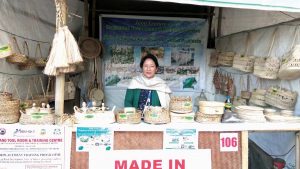Nagaland
Going bananas: Perfect substitute for hazardous plastic items

Our Correspondent
Kohima, Dec. 2 (EMN): Human beings have been contaminating the planet with non-biodegradable artificial products coupled with poor waste management for so long that it will soon become unliveable if trend continues owing to the catastrophic impact it has on the environment. While many still unwittingly create plastic waste, some put in concerted effort to control this menace, and Imlimenla Jamir from Nagaland is one of them.
Jamir established micro-scale industry called M/S Amity Banana Fibre and Allied Products (ABFAP) in 2016 in Nagaland’s commercial hub Dimapur to make several eco-friendly products, including bags, basket, brooms, shopping bags, hat, and tablemat out of waste banana stems to replace synthetic items.
Produce from ABFAP, a banana fibre project, are biodegradable unlike plastic items that are not only polluting the environment but also endangering the lives of living beings, making it a perfect enterprise to help the state government’s initiative to make Nagaland plastic waste-free by the end of this year. Chief Minister Neiphiu Rio has also said that funds have been sanctioned to all the districts to make alternative bags available to the people in the wake of single-use plastic items being banned in the state.
Banana fibre project is a process of extracting fibre from wild banana plants that are left to rot after harvesting its fruit.
Jamir said that the fibre is extracted from the sheaths of wild banana plants by using ‘banana fibre extraction machine’ but domestic banana plants are not fit for use. Other methods of extraction include chemical process by adopting pressure-free digestion in open condition and manual process where fibre is extracted with the help of a scrapper.
The Naga entrepreneur explained that the fibre extracted using ‘banana fibre extraction machine’ is dried for three days before being used for making products such as hand bags, basket, brooms, shopping bags, hat, table mat, and various other decorative items. The industry also uses the residue from the extraction machine for vermicomposting, which is further used to cultivate mushrooms in small quantity, and the liquid waste as fertilisers and for cooking.
“It takes about nine days to make big items while smaller ones take lesser time. Half kilogram of fibre can be extracted from one banana plant,” said Jamir, adding that banana plants are currently being sourced from nearby forest in Dimapur but ‘planning to expand farms in some of nearby villages.’
For a change, ABFAP has collaborated with Nagaland Tools Room and Training Centre under the department of Industries and Commerce for the first time to open a stall outside the Bamboo Pavilion entrance gate at the Naga Heritage village in Kisama, Kohima, to showcase its products at the ongoing Hornbill festival. Jamir and her son Ali Walling are selling their products for prices ranging from INR 50 to 1,500.
Banana fibre extraction machine
It is one of the six machines being manufactured and displayed by the Nagaland Tools Room and Training Centre under the department of Industries and Commerce. It is a single-operator machine that can be easily transported and installed. In terms of configuration, it weighs 125 kg and measures 3 ft in height, length – three-and-a-half ft—and 2 ft wide. It runs on 3 HP, single phase.
The machine has an output capacity of 5 to 10 kg per day and costs INR 80, 000. So far, the department has only manufactured one unit; it will be made available for purchase only after the Hornbill festival but pre-order is already open.

